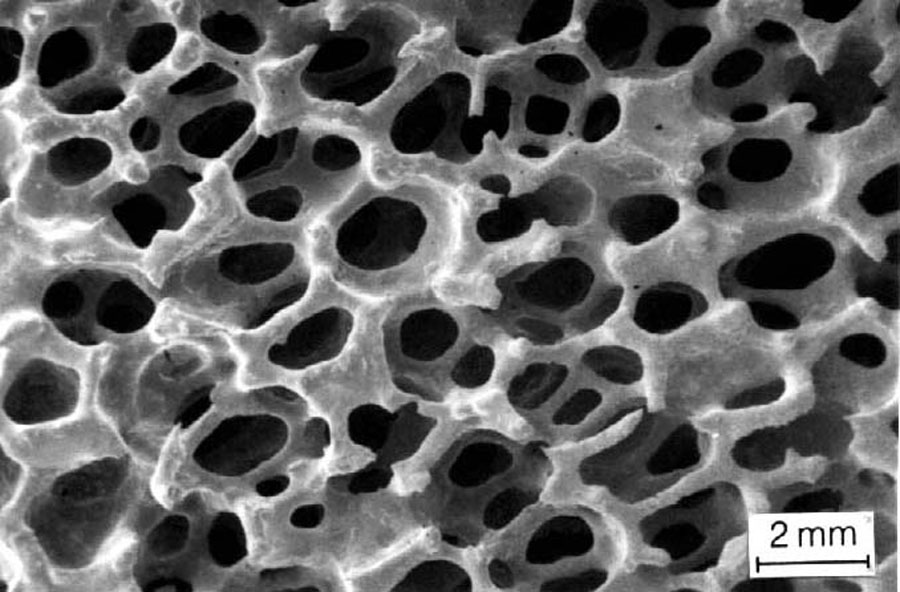MATSE 564/E MCH 535:
DEFORMATION MECHANISMS IN MATERIALS
Open Cell Ceramic Foam
MeetingDays/Times: T R 11:15AM
- 12:30PM
Classroom:
104 Steidle
Instructors:
Prof. D. A. Koss and Prof. D. J. Green
Instructor Information:

David J. Green, Professor of Ceramic Science & Engineering,
230 Steidle Building,
Phone: 863-2011. Email: green@ems.psu.edu
Personal Web
Page:

Donald A. Koss, Professor of Materials Science & Engineering,
202A Steidle Building,
Phone: 865-5447. Email: koss@ems.psu.edu
Personal
Web Page:
Shortcuts to
Overview
Course Outline
Course Content
Lecture Notes
Required Textbook
Course Evaluation
Reserve Books
Academic
Integrity and a Learning Culture
Overview:
The primary design criteria for most structural materials involve a combination
of stiffness, strength, and fracture resistance properties. As a companion
to MATSE 563 course, this course addresses the mechanisms that control stiffness
and strength. The range of deformation includes elastic, viscous, viscoelastic
and plastic deformation of materials. The course emphasizes how strength
and stiffness are controlled and improved by manipulating the materials structure.
For a materials engineer, an understanding of the mechanisms of deformation
serves as a basis for predicting failure conditions of structural materials
in an “enlightened” manner as well as the basis for materials development
for increased stiffness or strength.
Return to top
Course
Outline:
PART I. DEFORMATION MECHANISMS IN BRITTLE MATERIALS
- STRESSES AND STRAINS
- LINEAR ELASTICITY
- ELASTIC CONSTANTS AND STRUCTURE
- RESIDUAL AND THERMAL STRESSES
- VISCOUS FLOW
- VISCOELASTICITY
PART II. DEFORMATION MECHANISMS IN DUCTILE MATERIAL
Return to top
Course
Content - Part I
- CLASS 1 STRAINS
- Introduction
- Displacements and position
- Normal and shear strains
- Repeated subscript notation
- Eulerian strain tensors
- Strain invariants
- Spherical and deviatoric strains
- Transformation
- Compatibility
CLASS 2 TENSORS AND STRESSES
- Tensors
- Second-order tensors
- Coefficients of Thermal Expansion
- Stress tensor
- Hydrostatic and deviator stresses
- Stresses on a plane
- Principal stresses
- Stress equilibrium
CLASS 3
CLASS 4 LINEAR ELASTICITY
- Generalized Hooke's Law
- Symmetry of Elastic Constants
- Strain Energy Density
- Representational Surfaces
- Composite Materials
- Anisotropic Indices
- Isotropic Materials
- Temperature Effects
CLASS 5
CLASS 6 ELASTIC CONSTANTS AND STRUCTURE I
- Interatomic potential and elastic constants
- Effect of anion repulsion
- Anisotropy trends
- Elastic behavior of glasses
- Empirical and predictive approaches
CLASS 7 ELASTIC CONSTANTS AND STRUCTURE II
- Constitutive equations for isotropic particulate composites
- Single inclusions
- Bounding approaches
- Specific geometry solutions
- Self-consistent solutions
- Thermal expansion
- Particulate composites
CLASS 8 ELASTIC CONSTANTS AND STRUCTURE III
- Elastic constants of random polycrystals
- Elastic properties of porous materials and cellular solids
- Microcracking and elastic behavior
- Thermal expansion
- Anisotropic composites
- Hierarchical structures
CLASS 9 RESIDUAL AND THERMAL STRESSES
- Particulate composites
- Fiber composites
- Sandwich structures
- Symmetric laminates
- Bi-layers
- Thermal stresses
- Composition-induced stress
CLASS 10
CLASS 11 VISCOUS DEFORMATION
- Linear viscous deformation
- Effect of temperature
- Effect of structure
- Structural relaxation
- Non-linear viscous flow
CLASS 12 VISCOELASTICITY
- Linear viscoelasticity
- Anelasticity
- Mechanical analogs.
- Creep and stress relaxation
- Effect of structure
CLASS 13 VISCOUS SOLIDS
Return to top
Lecture
Notes - Part I
Notes for these lectures will be available on ANGEL
|
Lectures
|
Topic
|
|
1
|
Strains
|
|
2
|
Tensors and Stresses
|
|
4
|
Linear Elasticity
|
|
6
|
Elastic Constants and Structure I
|
|
7
|
Elastic Constants and Structure
II
|
|
8
|
Elastic Constants and Structure
III
|
|
9
|
Residual and Thermal Stresses
|
|
11
|
Viscous Deformation
|
12
|
Viscoelasticity
|
13
|
Viscous Solids
|
Return to top
Required
Textbook:
There is no required textbook but the following book is useful
as a reference to the Part I of the course
- Introduction to the Mechanical
Properties of Ceramics, D. J. Green.
There are some
errors in the book. To obtain corrections click here
Return to top
Reserve
Books
The following books have been placed on reserve in the Penn State Libraries
and they are useful as supplements to the course. Some books cover
advanced topics, others deal with the same subject matter but from an
alternative viewpoint.
- A. H. Cottrell, Mechanical Properties of Matter
- T. H. Courtney, Mechanical Behavior of Materials
- D. J. Green, Introduction to Mechanical Properties of Ceramics
- J. B. Wachtman, Mechanical Properties of Ceramics
- R. W. Hertzberg, Deformation and Fracture Mechanics of Engineering
Materials
- A. Kelly and N. MacMillan, Strong Solids, Oxford Science Publications
- J. F. Nye, Physical Properties of Crystals
- T. W. Clyne and P. J. Withers, An Introduction to Metal Matrix Composites.
Return to top
Course
Evaluation - Part I
Evaluation of the Part I of the course will be homework assignments
that involve items such as problem solving, literature searches and
case studies. A mid-term examination will test the integration of
the concepts.
Return to top
Academic
Integrity and the Promotion of a Vibrant Learning Culture:
The following recommendations address the partnership between the faculty-teacher
and student-learner in the personal process of learning with a focus
on the maturation of students in the learning process (Senate Policy
49-20).
The Teacher in the Learning Process.
Maintaining a high level of learning requires characteristics
in teaching necessary for a strong teacher-learner relationship.
The teacher should:
- Maintain an atmosphere of integrity, civility and respect.
- Exhibit a strong desire for students to learn.
- Recognize that effective teaching requires a balance
among teaching, advising, research, and service.
- Encourage active student participation in learning.
- Employ effective teaching and learning strategies.
- Help students connect learning experiences.
- Develop an effective personal teaching approach.
The Student in the Learning Process.
Maintaining a high level of learning and scholarly activity
requires the following characteristics of the student learner:
- Academic integrity, respect, and civility.
- Strong work ethic.
- Manage time wisely.
- Participate actively in class.
- Recognize importance of out-of-class learning.
- Reflect on the educational process.
- Perform self-assessment.
Academic Integrity (Senate Policy 49-20)
STANDARDS OF CONDUCT (Graduate School Policies
)
By virtue of their maturity and experience, graduate students are expected
to have learned the meaning and value of personal honesty and professional
integrity before entering the Graduate School. Every student is expected
to exhibit and promote the highest ethical and moral standards. A violation
of such standards is regarded as a serious offense, raising grave doubt
that the student is worthy of continued membership in the Graduate School
community. The University Code of Conduct is found in Appendix
I of the Graduate School Policies. Violation of the Code
may result in suspension or dismissal from the Graduate School.
Research Integrity--Graduate students are expected to adhere
to the highest standards of research integrity in the conduct of their
research and other educational activities. They are subject to University
policy AD-47, which applies to all University personnel engaged in
research activities. This policy may be accessed electronically through
the University's General University Reference Utility (GURU).
For MatSC 564/E MCH 535 the following specific points should also be considered.
- For homework problems, there is no difficulty in consulting
other students but the final answer to the problems should be performed
on an individual basis. No item should be copied from any document
that belongs to another person. This includes electronic files,
documents, spreadsheets, graphs, etc.
- In examinations, only stipulated information can be
used during the evaluation nor should students copy from other students
in the class.
- All information obtained from the scientific or engineering
literature must be referenced.
Return to top



